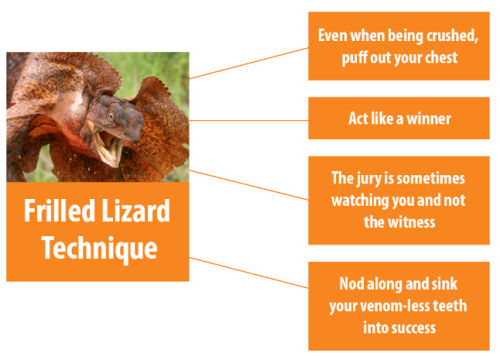The frilled-neck lizard of Australia is a brownish-gray lizard. Nothing is special about it – until you scare it.
When threatened, this lizard raises up on its hind legs and fans a bright red frill around its neck, velociraptor style. The display is spectacular enough to frighten a wild dog into a tail-tucked retreat. It has no venom or sharp teeth; it just acts like it does.
* * *
I first saw the "frilled lizard technique" in the courtroom while trying a medical malpractice case against a highly reputable attorney ("Famous Lawyer"). Knowing we were up against one of the best, we worked tirelessly to prepare our star expert for what would certainly be a brutal cross-examination.
At trial, our expert killed it. He was incredible. He handled Famous Lawyer beautifully. It took every bit of restraint not to stand up and holler "BOO-yah!"
Glancing away from our expert over to the jury box, I realized the jurors didn't share my enthusiasm. We might think our expert was awesome, but the jury didn't look the least bit entertained. They just sat there looking – not at our expert, but at Famous Lawyer!
Yes, it was the "frilled lizard technique." Famous Lawyer knew he was getting crushed. Yet, instead of retreating, he puffed his chest and raised his bright frill. Smiling and nodding along with the expert, he acted like he was winning. His confidence was palpable. I honestly don't know whether the jury thought Famous Lawyer crushed our expert or; worse yet, our expert was actually his witness. Either way, he scored points that day. I learned a valuable lesson.

* * *
Smart trial lawyers are well-versed in the laws of man. Brilliancy in the courtroom demands appreciation of the laws of man and the rules of Mother Nature.
Over the years, I've collected a few examples of Mother Nature's lessons worthy of courtroom consideration. These lessons in the form of tips will be posted regularly in a series entitled, "Trial by Nature: Tips to Survival in the Courtroom".
The content of this article is intended to provide a general guide to the subject matter. Specialist advice should be sought about your specific circumstances.

